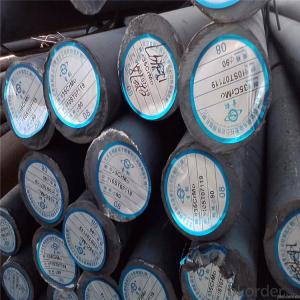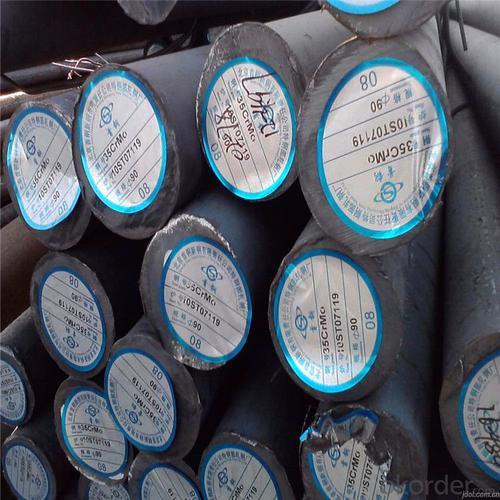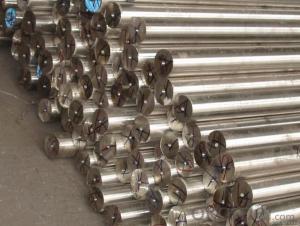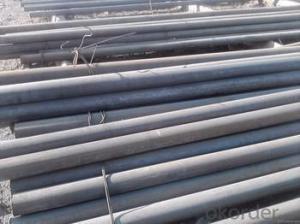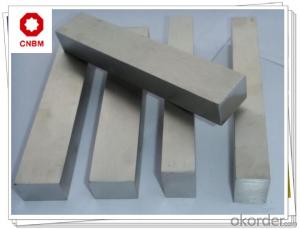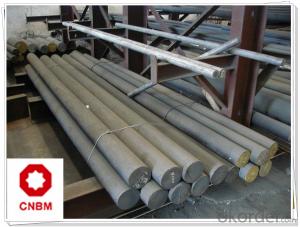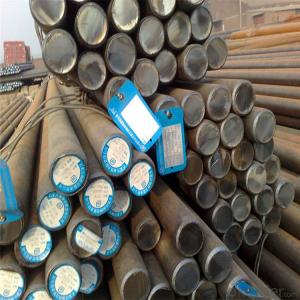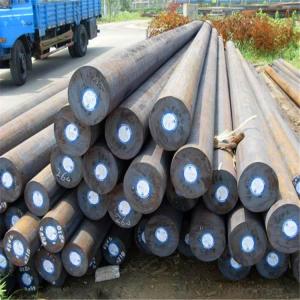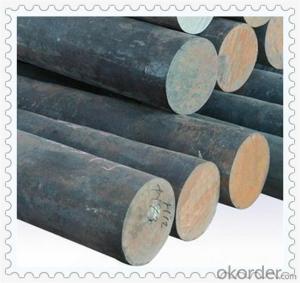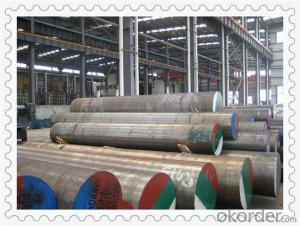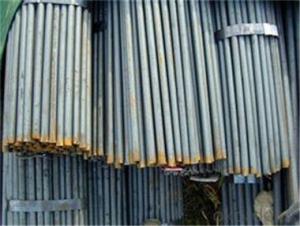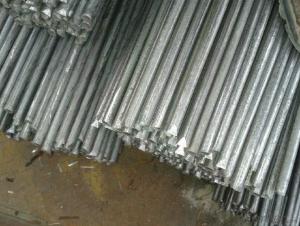S40C S45C SAE1040 SAE 1045 Steel Round Bars
- Loading Port:
- Tianjin
- Payment Terms:
- TT OR LC
- Min Order Qty:
- 100 m.t.
- Supply Capability:
- 500000 m.t./month
OKorder Service Pledge
OKorder Financial Service
You Might Also Like
Specification
S40C S45C SAE1040 SAE 1045 Steel Round Bars
Product Description of S40C S45C SAE1040 SAE 1045 Steel Round Bars
1. Steel grade: SAE1040, 40#, C40, S40C
2. Length: 6M-12M
3. Diameter: 16mm-300mm
4. Product range: round bar, flat bar, square bar
5. Technique: Hot rolled, forged, cold drawn
Specification of S40C S45C SAE1040 SAE 1045 Steel Round Bars
Material | S40C | Round bar | Dia(mm) | 16-300mm |
Process | EAF + LF + VD + Forged + Heat Treatment (optional) | Length (mm) | Max 12m | |
Heat treatment | Normalized / Annealed / Quenched / tempered | Flat bar | Thickness(mm) | 8-500mm |
Delivery condition | Hot forged +Rough machined (black surface after Q/T)+ Turned (optional) | Width(mm) | 70-200mm | |
Test | Ultrasonic test according to SEP 1921-84 D/d | Length (mm) | Max 12m |
Chemical Composition of S40C S45C SAE1040 SAE 1045 Steel Round Bars
C | Si | Mn | Cr | Ni | Cu |
0.37~0.43 | 0.17~0.37 | 0.35~0.65 | ≤0.25 | ≤0.30 | ≤0.25 |
Photo Show of S40C S45C SAE1040 SAE 1045 Steel Round Bars
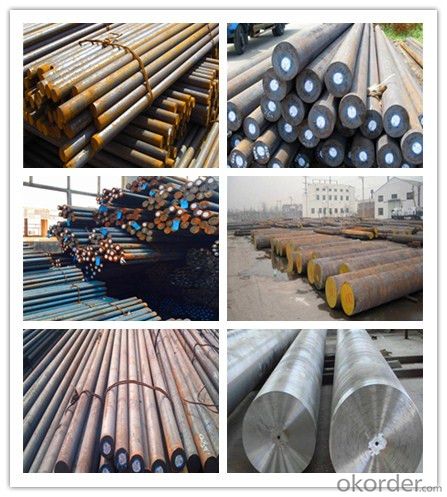
Packing and Delivery:
Packing in bundle package, or as customer's requirements.
Delivery Detail: 45 days after receiving the deposit.
Usage and Applications of S40C S45C SAE1040 SAE 1045 Steel Round Bars
1. Steel round bar is used in a large number of architectural and engineering structures. Or it can be used in construction of plants for the production of steel house frames, high-voltage transmission towers, bridges, vehicles, boilers, containers, ships, etc.
2. And we can use this kind of product on the performance of the mechanical parts if the demand is not very high.
3. Some special material steel round bar can be used for main shaft of steamer, hummer shank, with big section and supper force.
Company Information
CNBM International Corporation is the most important trading platform of CNBM group.
Whith its advantages, CNBM International are mainly concentrate on Cement, Glass, Iron and Steel, Ceramics industries and devotes herself for supplying high qulity series of refractories as well as technical consultancies and logistics solutions.


F A Q
1, Your advantages?
professional products inquiry, products knowledge train (for agents), smooth goods delivery, excellent customer solution proposale
2, Test & Certificate?
SGS test is available, customer inspection before shipping is welcome, third party inspection is no problem
3, Factory or Trading Company?
CNBM is a trading company but we have so many protocol factories and CNBM works as a trading department of these factories. Also CNBM is the holding company of many factories.
4, Payment Terms?
30% TT as deposit and 70% before delivery.
Irrevocable L/C at sight.
5, Trading Terms?
EXW, FOB, CIF, FFR, CNF
6, After-sale Service?
CNBM provides the services and support you need for every step of our cooperation. We're the business partner you can trust.
For any problem, please kindly contact us at any your convenient time.
We'll reply you in our first priority within 24 hours.
- Q: What are the advantages of using nickel-manganese alloy steel round bars?
- There are several advantages of using nickel-manganese alloy steel round bars. Firstly, these bars have excellent strength and toughness, making them suitable for applications that require high load-bearing capacity. Secondly, nickel-manganese alloy steel round bars exhibit good corrosion resistance, making them ideal for use in environments with high moisture or chemicals. Additionally, these bars offer good weldability, allowing for easy fabrication and assembly. Lastly, the inclusion of nickel and manganese in the alloy enhances the bars' heat resistance, making them suitable for applications involving high temperatures. Overall, the use of nickel-manganese alloy steel round bars provides a combination of strength, corrosion resistance, weldability, and heat resistance, making them a versatile choice for various industrial applications.
- Q: How do steel round bars differ from other types of steel bars?
- Steel round bars differ from other types of steel bars primarily in their shape. Unlike flat bars or square bars, round bars have a cylindrical shape with a circular cross-section. This shape makes round bars highly versatile and suitable for various applications, such as construction, manufacturing, and engineering. Round bars also offer superior strength and durability due to their uniform composition and absence of sharp edges, making them ideal for load-bearing purposes.
- Q: What are the typical hardness values for different grades of steel round bars?
- The hardness values of steel round bars can differ depending on the grade and manufacturing process. However, there are some general hardness values that can serve as a reference. For low carbon or mild steel round bars, the typical hardness values range from approximately 120 to 250 Brinell Hardness (HB). These grades of steel are known for their relatively low strength and hardness, but they can be easily machined and welded. Medium carbon steel round bars, commonly used in applications requiring higher strength and hardness, typically have hardness values ranging from about 200 to 400 HB. These grades of steel are often utilized in construction, automotive, and machinery industries. High carbon or alloy steel round bars, which offer even greater strength and hardness, can have hardness values ranging from 400 to 700 HB or even higher. These grades of steel are commonly applied in applications that demand high wear resistance, like cutting tools, gears, and bearings. It is important to acknowledge that these hardness values are approximate and can vary based on factors such as heat treatment, alloy composition, and the specific manufacturing process used. Therefore, it is always advisable to consult the manufacturer's specifications or perform hardness testing to determine the precise hardness values for a particular grade of steel round bar.
- Q: What are the different surface treatments available for tool steel round bars?
- There are several surface treatments available for tool steel round bars, which are used to enhance the performance, durability, and overall quality of the steel. Some of the common surface treatments for tool steel round bars include: 1. Nitriding: This process involves exposing the tool steel to a nitrogen-rich environment at high temperatures. It forms a hard surface layer that improves wear resistance and reduces friction. 2. Coating: Tool steel round bars can be coated with various materials such as titanium nitride (TiN), titanium carbonitride (TiCN), or chromium nitride (CrN). These coatings provide excellent resistance to wear, corrosion, and heat. 3. Black oxide: It is a chemical treatment that forms a black oxide layer on the surface of the tool steel. This treatment improves corrosion resistance and reduces the risk of rusting. 4. Heat treatment: Tool steel round bars can undergo heat treatment processes such as annealing, tempering, or quenching. These treatments help to improve the hardness, strength, and toughness of the steel. 5. Surface grinding: This process involves removing a thin layer of material from the surface of the tool steel. It helps to achieve a smooth and polished surface, enhancing the aesthetics and reducing the risk of surface defects. 6. Shot peening: It is a process where small metal or ceramic particles are propelled onto the surface of the tool steel at high velocity. This treatment induces compressive stress, improving the fatigue resistance and extending the lifespan of the steel. 7. Electropolishing: This treatment involves immersing the tool steel in an electrolyte bath and applying an electric current. It helps to remove surface imperfections, enhance the surface finish, and improve corrosion resistance. These surface treatments can be chosen based on the specific requirements and applications of the tool steel round bars. Each treatment offers unique benefits and can significantly enhance the performance and longevity of the tool steel.
- Q: Can steel round bars be used in the manufacturing of springs?
- Yes, steel round bars can be used in the manufacturing of springs. Steel is a common material used in spring manufacturing due to its excellent properties such as high strength, durability, and flexibility. Steel round bars can be shaped and formed into the desired spring shape using various manufacturing processes like hot rolling, cold drawing, or machining. The specific type of steel round bar used will depend on the application and desired characteristics of the spring, such as the level of stiffness or resistance required. Overall, steel round bars are a widely used and reliable choice for the manufacturing of springs.
- Q: What are the different types of surface defects that can occur in steel round bars?
- There are several types of surface defects that can occur in steel round bars. Some of the most common defects include: 1. Scratches: These are shallow grooves or marks on the surface of the round bar caused by friction or contact with sharp objects during handling or transport. 2. Pitting: Pits are small, localized cavities or depressions on the surface of the round bar caused by corrosion or exposure to harsh environments. Pitting can lead to further corrosion if not addressed. 3. Scale: Scale refers to the thin layer of oxide or other impurities that can form on the surface of steel round bars during the manufacturing process. It can affect the appearance and quality of the bar but is often removed during subsequent processing or cleaning. 4. Scabs: Scabs are irregularly shaped protrusions or raised areas on the surface of the round bar caused by solidification or cooling issues during the casting process. They can reduce the strength and integrity of the bar if not properly addressed. 5. Roll marks: These are elongated depressions or ridges on the surface of the round bar caused by uneven or improper rolling during the manufacturing process. Roll marks can affect the dimensional accuracy of the bar and may require additional processing or grinding to remove. 6. Laminations: Laminations are internal defects that can sometimes be visible on the surface of the round bar. They are caused by improper bonding or separation of layers during the steelmaking process. Laminations can weaken the bar and reduce its load-bearing capacity. 7. Inclusions: Inclusions are non-metallic particles or impurities that can become trapped in the steel during the manufacturing process. They can appear as dark spots or irregularities on the surface of the round bar and may affect its mechanical properties. It is important to note that these surface defects can vary in severity and impact on the performance of the steel round bar. Manufacturers and quality control personnel employ various inspection techniques to identify and mitigate these defects to ensure the quality and reliability of the final product.
- Q: What is the maximum vanadium content allowed for steel round bars?
- The maximum vanadium content allowed for steel round bars varies depending on the specific steel grade and industry standards. Vanadium is commonly used as an alloying element in steel to improve its strength, hardness, and resistance to corrosion. In general, the maximum vanadium content in steel round bars ranges from 0.02% to 0.25%. However, it is important to note that different steel grades and applications may have specific limits set by industry regulations or customer requirements. Therefore, it is crucial to consult the relevant standards and specifications for the specific steel grade and application to determine the maximum allowed vanadium content for steel round bars.
- Q: How do you measure the diameter of a steel round bar?
- To measure the diameter of a steel round bar, you can use a caliper or a micrometer. Simply place the measuring tool across the widest point of the bar and read the measurement displayed on the tool.
- Q: How do steel round bars compare to wood round bars?
- Steel round bars have several advantages over wood round bars. Firstly, steel is much stronger and more durable than wood, making steel round bars a more reliable and long-lasting option. Steel round bars also have higher tensile strength, meaning they can withstand greater force without breaking. Additionally, steel is resistant to moisture, rot, and pests, making it a better choice for outdoor or high-moisture environments. On the other hand, wood round bars may be preferred in certain applications for their natural aesthetic appeal and lower cost. Overall, steel round bars offer superior strength, durability, and resistance to environmental factors compared to wood round bars.
- Q: What are the tolerances for steel round bars?
- The tolerances for steel round bars typically depend on the specific industry standards and customer requirements. However, common tolerances for steel round bars include variations in diameter, straightness, length, and surface finish. These tolerances ensure that the steel round bars meet the desired specifications and can be effectively used in various applications.
Send your message to us
S40C S45C SAE1040 SAE 1045 Steel Round Bars
- Loading Port:
- Tianjin
- Payment Terms:
- TT OR LC
- Min Order Qty:
- 100 m.t.
- Supply Capability:
- 500000 m.t./month
OKorder Service Pledge
OKorder Financial Service
Similar products
Hot products
Hot Searches
Related keywords
